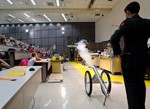Category Science & Technology
Unique art and science project displayed at National Science Foundation
A series of paintings, quilts and other artworks developed through a collaboration between artists and ecologists in Wisconsin is on display at the headquarters of the National Science Foundation in Virginia.
Study pinpoints effects of different doses of an ADHD drug; finds higher doses may harm learning
New research with monkeys sheds light on how the drug methylphenidate may affect learning and memory in children with attention deficit hyperactivity disorder.
UW law professor offers look at FDA from the inside out
UW Law Professor R. Alta Charo was senior policy adviser to the commissioner at the Food and Drug Administration from August 2009 until June 2011. Now back on campus, Charo spoke reflects on her time with the FDA.
Wisconsin Institutes for Discovery named 2012 Laboratory of the Year
The Wisconsin Institutes for Discovery, the innovative 330,000-sqaure-foot public-private facility that opened just more than a year ago on the UW–Madison campus, has been named the 2012 Laboratory of the Year.
In new book, leading neuroscientist describes your brain on emotion
Building on more than 30 years of cutting-edge brain research, a new book by UW–Madison psychology and psychiatry professor Richard J. Davidson offers an inside look into how emotions are coded in our brains and our power to control them.
Nelson Institute awarded UW–Madison’s first S-STEM grant from NSF
The Nelson Institute for Environmental Studies has been awarded UW–Madison's first-ever National Science Foundation S-STEM grant for undergraduate scholarships in Science, Technology, Engineering and Mathematics (STEM).
Communicating danger across 10,000 years
Giant symbols carved into canyon walls might tell the story of a long-ago hunt, a creation myth, or a genocide - but because the cultures who created rock art have vanished, there is no way of discerning their exact meaning.
Daya Bay antineutrino detectors exceed performance goals
After just three months of operation, the Daya Bay Reactor Neutrino Experiment has far surpassed expectations, recording tens of thousands of particle interactions and paving the way to a better understanding of neutrinos and why the universe is built of matter rather than antimatter.
See restored Curry murals at Wednesday Night @ the Lab
A remarkable University of Wisconsin–Madison research triumph and artful renderings depicting the importance of biochemistry are the subject of a rare occurrence of the popular Wednesday Night @ the Lab series.
Exploring interfaces between science, humanities
The semester-long, $2,500 Emerging Interfaces Awards were created as a way to explore the different ways thinkers in the humanities and sciences approach discovery.
Surprising diversity at a synapse hints at complex diversity of neural circuitry
A new study reveals a dazzling degree of biological diversity in an unexpected place - a single neural connection in the body wall of flies.
Two UW–Madison researchers awarded prestigious Sloan Fellowships
Two members of the University of Wisconsin–Madison faculty are among 126 scientists from around the country who have been awarded prestigious Alfred P. Sloan Research Fellowships.
Early spring: Good for us, mixed bag for insects, plants
Madison’s warm weather may have made the outdoors more comfortable for people, but does it spell trouble for overwintering plants and bugs?
Recent sightings: Wonders of Physics
Physics student Blaine Law (right) uses the pressure of liquid nitrogen changing from a liquid to a gas to power a canon during a…
Does history repeat? Using the past to improve ecological forecasting
To better predict the future, Jack Williams is looking to the past.
Proposed hunt poorly designed, says UW wolf expert
Legislation outlining a proposed state wolf hunt is likely to hurt wolf populations while failing to resolve existing conflicts with humans, says a UW–Madison wolf…
Mother of pearl tells a tale of ocean temperature, depth
Nacre -- or mother of pearl, scientists and artisans know, is one of nature's amazing utilitarian materials.



